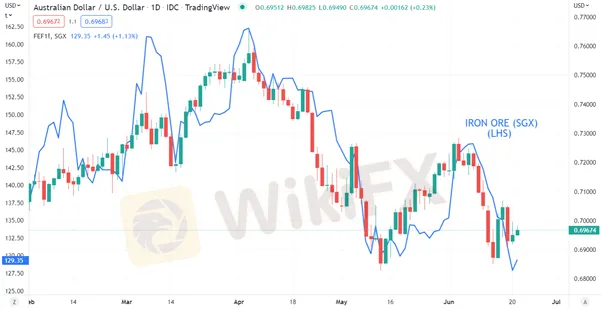简体中文
繁體中文
English
Pусский
日本語
ภาษาไทย
Tiếng Việt
Bahasa Indonesia
Español
हिन्दी
Filippiiniläinen
Français
Deutsch
Português
Türkçe
한국어
العربية
Australian Dollar Bounces on Hawkish RBA
Abstract:AUSTRALIAN DOLLAR, AUD/USD, RBA, YCC, IRON ORE, CHINA- TALKING POINTS
Click Here: After you read it, Daily Routine with WikiFX
The Australian Dollar hasn't changed since the RBA spent the morning talking to the public.
The RBA's media department has had a busy day. Their review of their yield curve control (YCC) program was published, Governor Lowe gave a speech, and the minutes from the June meeting of the monetary policy committee were made public.

Dr. Lowe was giving a speech in Sydney at an event put on by the American Chamber of Commerce. He basically went over the main points of the YCC review again and said the same things he said last week.
Most importantly, the RBA thinks that inflation will reach 7% in the December quarter and that the cash rate could reach 2.5% later this year.
The RBA famously gave up on the YCC program in November 2021, when underlying conditions and the market forces they caused simply made it useless.
The RBA knows that YCC had problems and that when the bank left the program, it hurt its reputation. Most notable was the volatility in the markets when fundamentally it no longer made sense to aim for a certain yield in a certain bond.
The bank said that the fact that it had said an exit from YCC would happen in 2024 was a big problem. When the policy was put into place, it was thought that the economy would grow at a slower rate and at a lower level than it did.
When it comes to inflation, Dr. Lowe pointed out three things that the bank thinks will bring inflation back to their target of 2% to 3% next year:
Pandemic supply problems will be fixed over time.
Technically speaking, inflation is the rate at which prices change, not the level of prices. For inflation to stay high, prices need to keep going up. (This is what the Fed called a “base effect”)
Tightening the world's monetary policy.
All of these are possible options, but they could also cause problems. At the very least, the demand side of inflation is the only thing a central bank can control. The RBA has made it clear that policy is getting tighter so that this can happen.
This week, the Australian Dollar is also being hurt by other things. The price of iron ore has dropped, as have the prices of many other industrial metals. Iron ore futures on both the Singapore Exchange (SGX) and the Dalian Commodity Exchange (DCE) are down about 20% from their April highs.
This is because people are worried about China's zero-case Covid-19 policy, which is hurting the world's second-largest economy.
Even though Beijing is trying to help with policy, sudden lockdowns keep the Chinese real estate market in a state of uncertainty.
Disclaimer:
The views in this article only represent the author's personal views, and do not constitute investment advice on this platform. This platform does not guarantee the accuracy, completeness and timeliness of the information in the article, and will not be liable for any loss caused by the use of or reliance on the information in the article.
Read more

ATFX Enhances Trading Platform with BlackArrow Integration
ATFX integrates the BlackArrow trading platform, offering advanced tools for forex, crypto, and stocks with automation and real-time analytics for traders.

Exposing the Truth: What Happened with the Losses of Thousands of Dollars on the GlobTFX Platform?
The facts are clear and undeniably shocking—GlobTFX has caused significant financial losses to well-known traders in the Arab world. Eighteen victims have confirmed a total loss exceeding $22,372! But this is just the tip of the iceberg…

Understanding Currency Intervention in Forex Markets
Currency intervention involves actions by a nation's central bank or monetary authority to influence the value of its currency in the foreign exchange (forex) market. These interventions aim to achieve specific economic objectives, such as controlling inflation, stabilizing the currency, or influencing trade balances.

UK Hits HSBC, 3 Banks with £104.4M Fine for Bond Misconduct
HSBC, Citi, RBC, and Morgan Stanley fined £104.4M by CMA for sharing sensitive bond market info, distorting UK gilts competition from 2009-2013.
WikiFX Broker
Latest News
Germany's Election: Immigration, Economy & Political Tensions Take Centre Stage
WikiFX Review: Is IVY Markets Reliable?
ATFX Enhances Trading Platform with BlackArrow Integration
Brazilian Man Charged in $290 Million Crypto Ponzi Scheme Affecting 126,000 Investors
IG 2025 Most Comprehensive Review
SEC Drops Coinbase Lawsuit, Signals Crypto Policy Shift
Construction Datuk Director Loses RM26.6 Mil to UVKXE Crypto Scam
Should You Choose Rock-West or Avoid it?
Franklin Templeton Submitted S-1 Filing for Spot Solana ETF to the SEC on February 21
Scam Couple behind NECCORPO Arrested by Thai Authorities
Currency Calculator






